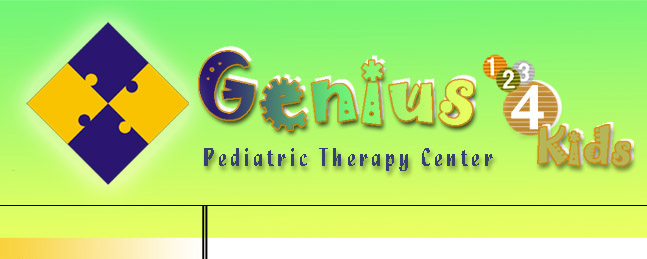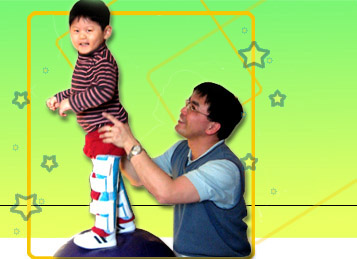|
Intensive
Therapy Program- ITP
The
Genius Physical Therapy PLLC is certified and authorized
by TheraSuit LLC to provide Intensive Therapy Program (ITP).
The Intensive Therapy Program is customized to fit the needs
of each special needed child. The Intensive Therapy
Program follows the " TheraSuit Method® " which
is an intensive strengthening program to treat various neurological
disorders such as Cerebral Palsy,
neuro-musculoskeletal or neuro-motor disorders,
Grobal or Developmental Delays,
and Traumatic Brain Injuries or
Spinal Cord Injuries. This
method utilizes the TheraSuit® and Universal Exercise
Unit combined with various treatment and handling strategies
to combat the effects of de-conditioning and immobilization
to promote the maximum potential
of independence.
The
TheraSuit Method® is based on an intensive and specific
exercise program. The key elements are joint mobility
free, muscle strengthening exercise program, and functional
goal training to reflect in the activities of daily living
(ADL). This Intensive Therapy Program established for
the participant based on each individual's needs. With
an intensive muscle strengthening exercise and a continuous
home program by the parents, we can expect to see increase
general muscle strength, tolerance, and endurance. The
TheraSuit Method® also eliminates pathological reflexes.
Moreover, it promotes and establishes a new and correct pathway
for a functional movement pattern that is very important for
children with special needs.
Our
Intensive Therapy Program is performed on a one-on-one basis
with a certified therapist. Different special program
options are offered to suit the child's needs. Our
goal is to:
"
promote their maximum potential of independent mobility
in minimal time and in their natural environment ".
Enroll
my child
Typical
Intensive Therapy Program (ITP) Treatment Session :
*
Preparation Phase --
This
preparation period consists of warming up the muscles through
hot packs and massage followed by muscle stretching and strengthening
exercises so that they are ready for the second phase of the
therapy.
- Moist
Hot-Packs - Apply 10 - 15 minutes of local heat to areas
of tight musculature.
- Therapeutic
Massage - Apply 10 -15 minutes massage to prepare muscles
(warming up muscles and increasing local circulation)
for muscle stretching and strengthening exercises.
- Muscle
Stretching and Range of Motion Exercises - 30-45 minutes
of muscle stretching, and combined with passive range
of motion exercises (PROM), active-assisted range of motion
(A-AROM), active range of motion (AROM) and/or resisted
range of motion (RROM) to prepare for muscle strengthening
and functional activities training.
- Muscle
Strengthening Exercises - Focus on weak single or muscle
groups, often utilizes the Universal Exercise Unit (UEU)
for muscle strengthening exercises.
- Manual
Therapy - Consists of soft tissue and/or join mobilizations
to increase joint mobility or provide proper joint stability
and prepare the body for movement/exercise.
- Sensory
Management - Consists of manual techniques, therapeutic
listening, and sensory integration program to provide
proper proprioceptive, auditory, and visual inputs to
promote engagement.
*
Second Phase --
During
the second phase of treatment sessions with applying combination
of TheraSuit® and floor activities, personally customized
activities which include proximal trunk stability training,
graded movement control in transitions, balance and coordination
training, and integrating all training skills into functional
activities such as head control, rolling, sitting up, crawling/creeping,
and walking training with assistive device or independence
are practiced.
- Applying
TheraSuit® and TheraSuit Method® (if eligible
per physician) - Applying TheraSuit® and TheraSuit
Method® for muscle strengthening, balance and coordination
control training, gait pattern and functional activity
training. TheraSuit® also provides a more ideal
alignment in positions and proper proprioceptive awareness
during these activities.
- Applying
Universal Exercise Unit (UEU) - It provides proper assistance
and resistance for weak single or muscle group muscle
strengthening, as well as improving muscle endurance,
enhances the single movement or the movement pattern learning,
and promotes, develops, and accelerates functional skills
learning.
- Proximal
Trunk Stability and Graded Movement Control Training -
It promotes foundation of the stability before the mobility.
- Balance
and Coordination Training - These skills are essential
in order to maintain different postures as well as to
be able to move throughout different positions independently.
- Functional
Activity Training - It includes activities such as head
control in different upright positions, rolling, sitting
up, crawling/creeping, kneeling, transfers, standing,
and walking training with assistive device or independence,
stair climbing, etc.
- Gait
Training - With and without assistive devices.
*
Third Phase --
- Home
Exercise Programs - In the third phase of the therapy,
home exercise programs and specific notices will be instructed
to consumers or their parents for further enrichment of
treatment. It contains detailed written home exercise
program booklet with pictures and instruction, and video.
Enroll
my child
**Glossary
--
*Muscle
Stretching and Range of Motion Exercises -
Depends on the consumer's participation level and degree of
muscle tightness, muscle stretching exercise (the proper muscle
lengthening) is necessary to prevent the development of joint
contractures in a grow process, to promote more freedom of
movement, and to prevent loss of maintaining a proper posture
in standing upright or in ambulation.
*
Muscle Strengthening Exercises - Muscle
weakness is a major detriment to children with neuromuscular
disorders as it hinders the achievement of gross motor skills.
Muscle strengthening exercises can help the child to increase
control over how their body moves. For example, if a
child exhibits a scissor pattern when they are walking, by
way of muscle stretching and strengthening exercises to their
muscle group around hips, the child can display greater control
movement to step properly. Muscle strength training
coupling with muscle stretching exercise is the most effective
in treatment strategy.
*Balance
and Coordination - Balance includes the
ability to maintain positions, and to recover and react from
forces that might throw you off balance, as well as the ability
to safely fall, minimizing injuries. Coordination is
the ability to smoothly execute a movement through space.
These skills are essential in order to maintain different
positions as well as to be able to move through different
positions independently. Balance and coordination depend
on the interaction of multiple body organs and systems including
the eyes (visual system), ears (auditory system), spatial
orientation (vestibular system), brain and nervous system
(ability of motor learning and motor control, and motor processing),
cardiovascular system and musculoskeletal system. Balance
and coordination skills sometimes do not naturally occur in
children with neuro-musculoskeletal or neuro-motor disorders,
and they hinder their achievement of independent motor skills.
These skills can be taught repeatedly, and many children successfully
learn balance strategies after proper and correct instructions
and practices.
By
using TheraSuit® and TheraSuit Method®, and Universal
Exercise Unit (UEU) during Intensive Therapy Program treatment
session, the children can learn graded balance and coordination
control. Having good balance and coordination skills
can be the difference between needing assistance and being
able to complete a movement independently. It promotes
a better muscle strength, enhances the single movement or
the movement pattern learning, and promotes, develops, and
accelerates functional skills learning in proper correct postures.
*Functional
Activities - Intensive Therapy Program
focuses on functional activities training to promote and develop
independence of graded control in movements, transitions,
and functional skills. The children with neuro-motor
or neuro-musculoskeletal disorders will practice or perform
needed movements, transitions (side-sitting to quadruped position,
side-sitting to kneeling, kneeling to standing via a half-kneeling,
sitting to standing, and squatting to standing), or functional
skill in different developmental positions (sitting, crawling/creeping,
standing, walking, jumping, hopping, etc.) on their own after
muscle stretching and strengthening, and balance and coordination
enhancing training. Repetition is necessary to learn
new motor skills, and providing instruction of the "Home
Exercise Programs" to parents after treatment sessions
allows for this practice to take place. Moreover, each
child will receive an individually designed program to meet
his or her specific needs and to ensure the accommodation
of each child's goals.
*Gait
Training - Practicing
or performing walking or ambulation training can lead to final
goals of independence. The children with neuro-motor
or neuro-musculoskeletal disorders will practice and learn
the concept of weight bearing on the lower extremities in
standing and weight shifting from side to side or forward
and backward (as a pre-ambulation training) along with the
consequences in a safe way. We also uses a variety of
assistive devices depending on each individual child's abilities
and needs. This will enable children in all developmental
levels to gain exposure to walking skills.
Print
informaiton about
Intensive Therapy
Program (ITP)
Enroll
my child
|



